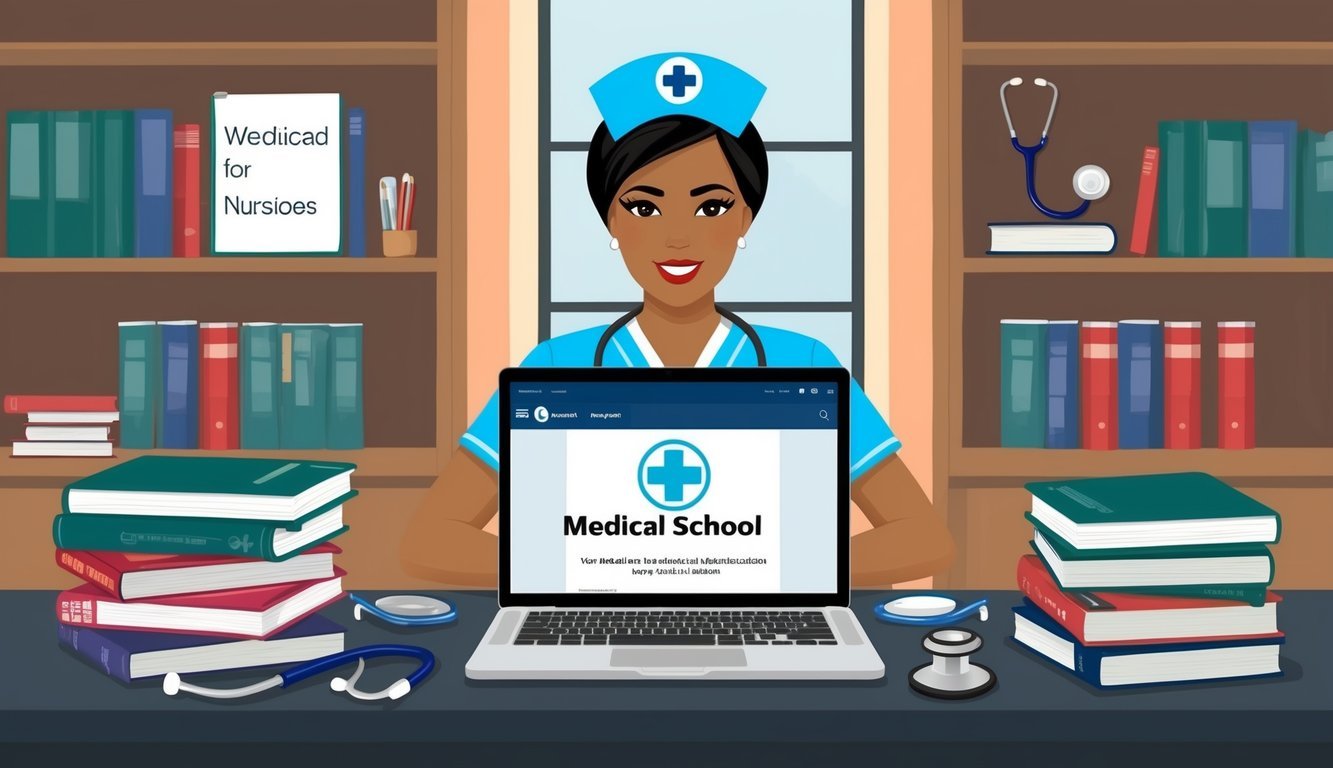Many individuals wonder if they can transition from being a nurse to pursuing a career as a doctor.
You can indeed go to medical school with a nursing degree, especially if you hold a Bachelor of Science in Nursing (BSN) or higher.
This pathway can provide a solid foundation for your future medical education, as many of the required courses overlap with nursing programs.
If you’re an RN looking to become an MD, you’ll need to complete the necessary prerequisites for medical school admissions.
Your nursing experience can enhance your application, showcasing your hands-on patient care skills and understanding of the healthcare environment.
Navigating this change involves understanding the application process, the demands of medical school, and the challenges ahead, but it is a rewarding journey.
Educational Pathways from Nursing to Medicine

Transitioning from nursing to medicine involves specific steps and choices.
Understanding your current credentials and the programs available can help you navigate this journey effectively.
You will also need to be aware of the required courses to meet medical school admission standards.
Evaluating Your Current Credentials
Begin by assessing your current qualifications.
If you hold a Bachelor of Science in Nursing (BSN) degree, you may have already completed many necessary undergraduate courses.
This is beneficial as it can satisfy some medical school prerequisites.
Typically, medical schools require coursework in:
- Biology
- Chemistry
- Organic Chemistry
- Physics
- Biochemistry
If you have gaps in these areas, you may need to take additional classes before applying.
Additionally, consider the Medical College Admission Test (MCAT), which assesses your knowledge and critical thinking skills in these subjects.
RN to MD Bridge Programs
Many institutions offer RN to MD bridge programs, designed specifically for registered nurses aiming to become medical doctors.
These programs often streamline your transition, allowing you to complete requirements more efficiently.
For example, some programs integrate your nursing experience with medical training.
This might include advanced standing in certain coursework.
Research different options to find one that suits your background and goals.
Look for programs accredited by relevant bodies to ensure quality education.
Required Medical School Prerequisites
Before applying to medical school, you’ll need to fulfill specific prerequisites.
These generally include, but are not limited to, the following courses:
| Required Course | Description |
|---|---|
| Biology | Foundations of biological sciences |
| Chemistry | Principles of chemical reactions |
| Organic Chemistry | Chemistry of carbon-containing compounds |
| Physics | Basics of physical laws |
| Biochemistry | Molecular processes in biology |
Completing these courses can help solidify your understanding and improve your chances during the medical school application process.
It’s crucial to gather this knowledge to perform well on the MCAT and become a competitive applicant.
The Medical School Application
The medical school application process involves several key components.
You need to excel in exams, write a compelling personal statement, gather strong recommendation letters, and successfully navigate interviews.
Taking the MCAT
The Medical College Admission Test (MCAT) is a critical step.
It assesses your knowledge in biological sciences, physical sciences, verbal reasoning, and behavioral sciences.
Preparation is essential.
Many students invest in prep courses, study groups, or commercial study materials.
You should aim for a competitive score, which is usually around 518 or above for top schools.
Plan your study schedule early.
Allocate time for practice tests and review areas where you feel less confident.
Use resources such as the AAMC’s official MCAT website for study material.
Understanding the exam format is also crucial for success.
Crafting a Compelling Personal Statement
Your personal statement is your chance to showcase who you are beyond grades and test scores.
Start by reflecting on your journey as a nurse and how it has prepared you for medical school.
Include specific examples of experiences that shaped your desire to pursue medicine.
Highlight your empathy, leadership skills, and teamwork in clinical settings.
Admissions committees appreciate narratives that show personal growth.
Keep your statement clear and focus on purpose.
Tailor it for each school, emphasizing why you’re a good fit for their program.
Obtaining Strong Letters of Recommendation
Letters of recommendation play a vital role in your application.
Aim for 2-3 letters from individuals who know you well, especially from academic or professional supervisors.
Your recommenders should highlight your strengths related to medicine.
This includes your clinical skills, work ethic, and interpersonal abilities.
Provide your recommenders with a brief about your achievements and aspirations.
It will help them write a more effective letter.
Make sure to approach them well in advance to give them enough time to prepare.
Navigating the Interview Process
The interview is often the final hurdle in the application process.
This is where you can showcase your personality.
Be prepared to discuss your experiences and motivations.
Questions may range from your clinical experiences to ethical dilemmas.
Practice common interview questions and prepare examples that illustrate your competencies.
Dress professionally and be punctual.
Demonstrating good communication skills during the interview is crucial.
Remember to ask thoughtful questions about the program, showing your genuine interest.
Life as a Medical Student
Transitioning from nursing to medical school brings both challenges and rewards.
Understanding the shift in responsibilities and the complexities of medical training can help you adapt effectively.
Transitioning from Nurse to Medical Student
Your nursing experience gives you a strong foundation.
Familiarity with patient care, physiology, and anatomy allows you to adjust to medical training more smoothly.
As a nurse, you’ve developed essential skills like bedside manner and forming professional relationships.
These abilities are invaluable in medical school, where communication and empathy are crucial.
The main difference is the depth of knowledge required.
You will study advanced topics like pathophysiology and microbiology, enhancing your understanding of diseases.
Embrace this transition as an opportunity to build on your prior knowledge.
Understanding the Rigors of Medical Training
Medical training is intensive, requiring dedication and resilience.
Courses are fast-paced, covering areas like pharmacology, diagnostics, and treatment protocols.
You will need to adapt to a heavier workload.
Here is a summary of key subjects you will encounter:
| Subject | Focus Area |
|---|---|
| Physiology | Body functions and systems |
| Anatomy | Structure of the body |
| Pathophysiology | Disease processes |
| Microbiology | Microorganisms and diseases |
Balancing lectures, study time, and assessments is vital.
Time management becomes critical as you juggle different responsibilities.
Clinical Rotations and Specialty Choices
Clinical rotations are a pivotal part of your medical education.
These experiences allow you to apply theoretical knowledge in real-world settings.
During rotations, you will explore various specialties.
This exposure helps you determine your interests in the healthcare field.
The choices can significantly impact your career path.
You will interact with diverse patients and healthcare teams, enhancing your understanding of patient care.
Engaging fully in these rotations will enrich your experience, shaping you into a well-rounded physician.
Graduation and Beyond: Residency to Licensure

After completing medical school, you will enter a crucial phase of your medical career involving residency, licensure, and possibly fellowship training.
Each of these steps is essential for becoming a fully-fledged physician.
Choosing a Residency Program
Selecting the right residency program is a significant decision.
Programs offer residents training in various medical specialties like family medicine, surgery, or pediatrics.
You should consider factors such as location, the program’s reputation, specialties offered, and its overall culture.
Fellowships can provide further specialization after residency.
It’s important to research the programs that align with your career goals.
Networking with current residents or attending program open houses can provide valuable insights into what to expect.
The United States Medical Licensing Examination (USMLE)
To practice medicine in the U.S., you must pass the USMLE.
This three-step examination assesses your medical knowledge and clinical skills.
- Step 1: Tests your understanding of basic medical sciences.
- Step 2: Evaluates clinical knowledge and skills.
- Step 3: Assesses your ability to practice medicine independently.
You will typically take Step 1 after your second year of medical school and steps 2 and 3 during residency.
Passing these exams is necessary for obtaining a medical license.
Board Certification and Fellowship Opportunities
After completing your residency, you can become board certified in your specialty.
This certification demonstrates your expertise to employers and patients.
To gain this, you must pass an additional exam specific to your specialty.
If you wish to further refine your skills, you may opt for a fellowship.
Fellowships provide advanced training in specific areas such as cardiology or oncology.
This additional training can open doors to specialized career options and enhance your practice as a physician.
Financial Considerations and Employment Outlook

When considering a career in medicine after nursing, financial aspects and job prospects play a crucial role in your decision.
Understanding the costs of medical school, salary expectations for physicians, and the job market outlook can help you plan your career path effectively.
Calculating the Cost of Medical School
The cost of medical school can be significant.
As of 2024, the median four-year cost of attendance is about $276,006 for public schools and $374,476 for private institutions.
This figure often includes tuition, fees, and living expenses.
Many students also take on debt to finance their education.
For the 2023 class, the median debt reached $200,000.
It’s essential to research financial aid options, including loans and scholarships, to manage these costs.
The AAMC provides resources to help you navigate this process.
Salary Expectations for Physicians
Physicians generally enjoy high earning potential compared to many other professions.
The median salary for physicians varies widely based on specialty.
Here’s a quick look:
| Specialty | Median Salary |
|---|---|
| Family Medicine | $220,000 |
| Internal Medicine | $230,000 |
| Surgery | $400,000 |
| Psychiatry | $290,000 |
While you may start with student debt, the long-term financial benefits of a medical career can be substantial.
Note that salaries for roles like nurse practitioners or certified registered nurse anesthetists (CRNAs) are also competitive, with CRNAs averaging about $190,000.
Job Market and Career Outlook
The job market for physicians is favorable.
According to the Bureau of Labor Statistics, physicians’ demand is projected to grow by 3% from 2020 to 2030.
This growth is driven by an aging population and increased healthcare needs.
For nurses considering a transition, there is good news too.
The career outlook for nurse practitioners is robust.
There’s a projected growth of 52% through 2029, making it one of the fastest-growing careers in healthcare.
Additionally, transitioning from nursing to medicine can provide diverse opportunities and enhance your long-term career trajectory.
Frequently Asked Questions
If you are considering transitioning from nursing to medicine, several common questions may arise.
This section addresses key aspects of the journey, including educational pathways, timelines, and how your nursing background can impact your future as a medical doctor.
What is the typical path for a nurse to transition into a medical doctor role?
The journey usually begins with earning a Bachelor of Science in Nursing (BSN).
After that, you need to complete any additional prerequisites for medical school.
This might include taking specific science courses if they were not part of your nursing program.
Are there specific bridge programs available for BSN degree holders to pursue an MD?
Yes, some institutions offer bridge programs that make it easier for BSN holders to transition to medical school.
These programs often focus on fulfilling any remaining prerequisites while enhancing your skills and knowledge relevant to medicine.
Research options at local universities or medical schools.
How long does it typically take for a nurse with a BSN to complete medical school?
Generally, medical school lasts about four years.
If you have already completed prerequisite courses, your path will align with traditional medical students.
After medical school, you will also need to complete residency, which can add several more years.
What do medical schools consider when accepting applicants with a nursing background?
Admissions committees often look at your academic performance, nursing experience, and recommendation letters.
Relevant clinical experience as a nurse can strengthen your application, showing your commitment to healthcare and patient care.
How might previous nursing experience influence the medical school journey for nurses?
Your nursing experience can provide a strong foundation in patient care.
It can also help you develop skills like communication, empathy, and critical thinking, which are crucial in medicine.
Many medical schools view this experience as advantageous.
Does a background in nursing provide any advantages when applying to medical school?
Yes, having a nursing background can be beneficial.
It typically means you have hands-on experience in a healthcare setting, which can make you a more competitive candidate.
Additionally, your understanding of patient needs can provide valuable insights during your medical education.

